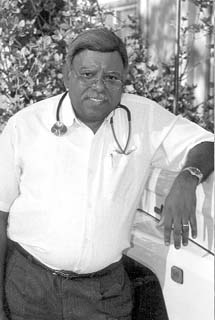The amazing Doctor K
Richard Di Natale pays tribute to one of Tennant's quiet achievers.
Some people go about their business with a minimum of fuss. They achieve
great things yet they somehow manage to remain inconspicuous in the
bustle of our daily lives. Their efforts go unnoticed but they continue
their work, oblivious to this lack of recognition probably because they
are driven by the strength of their convictions. Anyinginyi Congress
has a person just like this.
He slips quietly into Tennant Creek on his monthly visits, makes his
camp at a local hotel and gets to work. He has been visiting Congress
regularly for thirteen years and has done more for the people of the
region than most of us could ever hope to do. His name is Meshach Kirubakaran.
Dr K, as he is known, as much for his expertise in kidney disease as
for ease of pronunciation, is probably the world's foremost authority
on kidney disease in Central Australian Aborigines. For over thirteen
years he has worked with the indigenous population around Central Australia
contributing to this previously non-existent body of knowledge.
Renal disease remains one of the leading causes of death amongst indigenous
people. It is a devastating, often terminal illness, that permeates
the fabric of most aboriginal lives and yet we know very little about
it. It forces people to leave their traditional lands so that they have
access to dialysis, or if they are fortunate enough, to be matched with
a compatible donor kidney for transplant. If they choose not to leave
their homes they face a distressing and tortuous end. But since his
appointment to Alice Springs Hospital Dr K has now begun to unravel
parts of the mystery of why so many indigenous Australians are afflicted
with this ubiquitous and often terminal disease.
In 1979 after training at the University of Madras in India, one of
the few Universities of the region to offer nephrology training to select
medical graduates, he began his long relationship with Australia. He
came with his family and worked as Renal Registrar in the Queen Elizabeth
Hospital, Adelaide until 1982.
The next five years were spent in India at a large tertiary hospital
but he returned again in 1986 on sabbatical to help run the nephrology
unit at Prince Henry's Hospital, Melbourne. While he was there he was
gently persuaded by some persistent staff members at Alice Springs Hospital
to move north and coordinate the opening of the Renal Dialysis Unit.
Despite the fact that he was bound to return to India five months after
the completion of his sabbatical, he was offered a permanent contract
and given a year of unpaid leave to consider a permanent move back to
Alice.
A disappointing year in a large hospital in India and more persistence
from the staff at the Alice Spings Hospital (in the form of a steady
stream of long distance phone calls) and Dr K was back in Alice. With
much of his family still in India he began the huge task ahead of him.
Thirteen years later, at a time when Prince Henry's Hospital has become
inner city apartments and the average stay after a move to the Territory
is less than two years, Dr K is still here.
His list of credits is impressive. He remains one of the very few doctors
to have been granted an honorary fellowship to the Royal Australasian
College of Physicians. He described a disease in a cohort of Aboriginal
patients who shared an unusual grouping of features as a result of their
impaired renal function. This is now known as Meshach's Syndrome.
Thanks to the large number of kidney biopsies he has performed on patients
at various stages of kidney disease, we are gaining a better understanding
about the causes of kidney disease in our indigenous people.
His research has somehow been slotted in among the countless hours visiting
remote Central Australian Communities as well as running the Renal Dialysis
Unit in Alice Springs. Through this work we are starting to understand
many of the factors contributing to this complex problem but his work
is only laying a foundation that needs to be built upon. Progress has
been slow because he has been unable to dedicate enough time to research
simply because the clinical workload is so immense. Expert hands on
the ground are in demand because the need is so immediate.
Dr K believes that part of the problem is that the issue of high Aboriginal
morbidity is still a low priority of government. "Australians do
not want to be told by an Indian man how to treat their Aborigines."
But despite the desperate need for more funding for research he makes
this point: "Even though we don't understand enough about renal
disease in Aborigines, one thing is certain. As the socioeconomic circumstances
of populations improve, so will kidney disease".
Luckily one of his daughters has been accepted to study medicine in
Australia so Dr K thinks he'll be around for a few years yet. If she
manages to get near her father's footsteps she'll make him a proud man.
